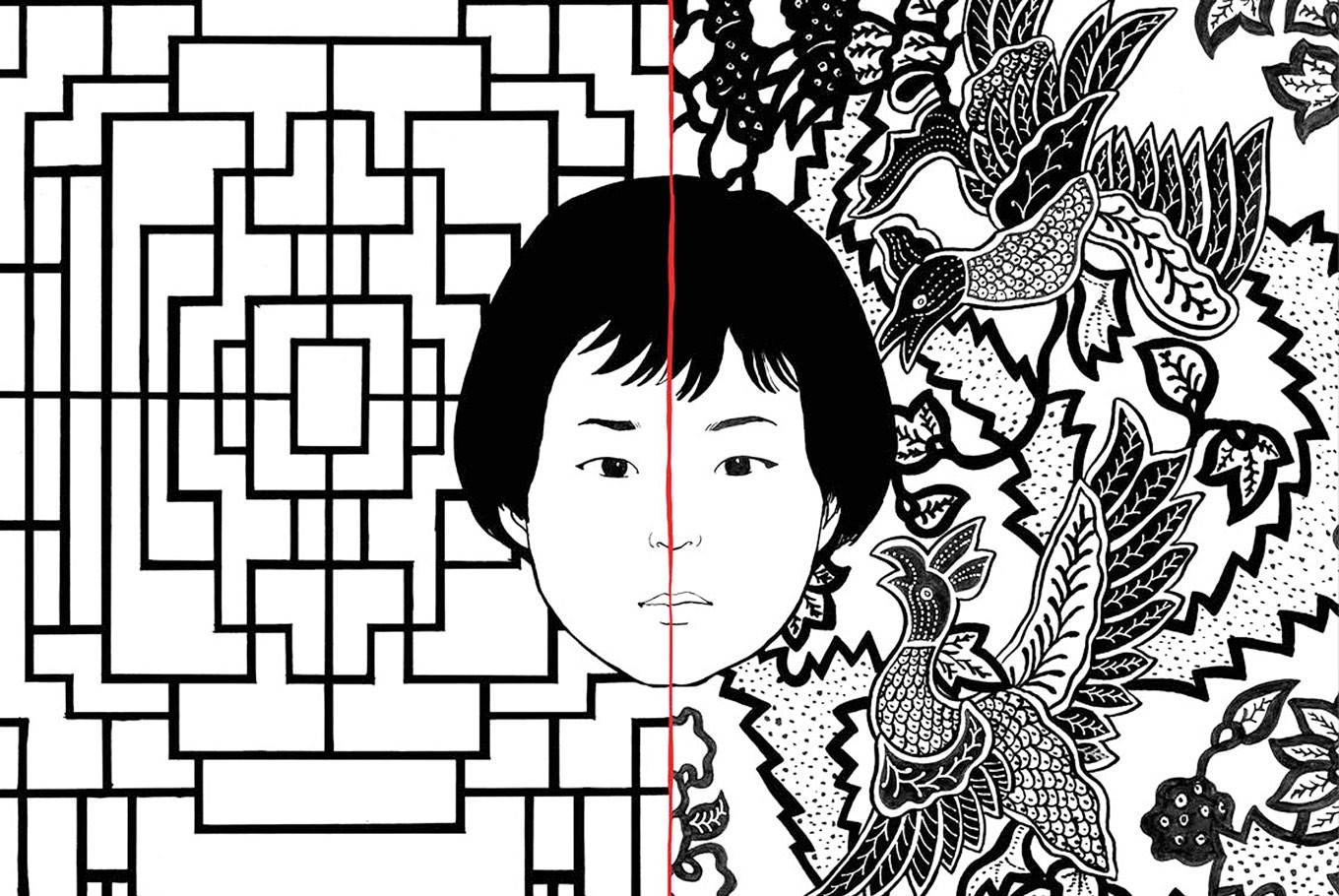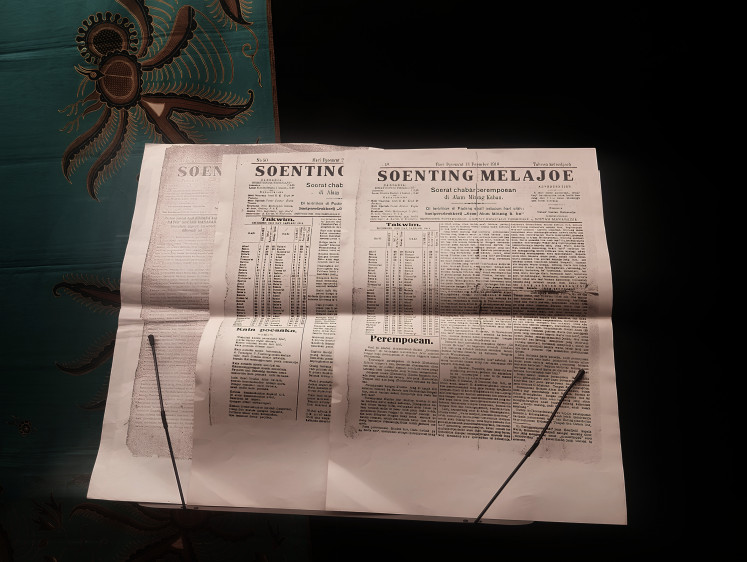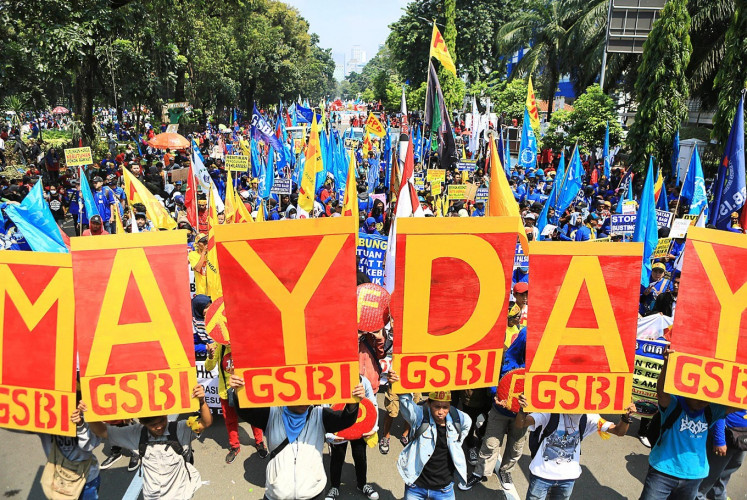20 years on: Reflecting on tragedy of 1998 through art
The violence that occurred shocked the nation to the core, over 1,000 people perished in huge fires and more than 150 reports of mostly ethnic Chinese women between the ages of 5 and 50 being raped began to emerge.
Change text size
Gift Premium Articles
to Anyone
 Dark moments: Scars from the racially tinged unrest are presented in "Chinese Whispers", an online graphic novel by Rani Pramesti and illustrated by Cindy Saja. (Rani P Collaborations/File)
Dark moments: Scars from the racially tinged unrest are presented in "Chinese Whispers", an online graphic novel by Rani Pramesti and illustrated by Cindy Saja. (Rani P Collaborations/File)
I
ndonesia enters its 20th year of political reform still bearing the deep wounds and division that were inflicted on the nation during the riots of May 1998. An economy in crisis, food shortages, political discontent and stirred up racial sentiment ended with large sections of Jakarta and other cities across the country consumed by chaos.
Days of rioting, which peaked from May 12 to 14, included widespread, violent attacks against the ethnic Chinese community with businesses and homes looted, women and girls raped and in some cases brutally murdered.
The Joint Fact Finding Team -- the independent body that was formed to investigate the riots -- suggested in their report that elements of the riots were intentionally caused and that groups of provocateurs directed portions of the violence.
The violence that occurred shocked the nation to the core, over 1,000 people perished in huge fires and more than 150 reports of mostly ethnic Chinese women between the ages of 5 and 50 being raped began to emerge.
One lasting legacy of the riots was the large-scale exodus of Chinese-Indonesians from their homes. Waves of migrants fearing for their safety fled abroad, settling in foreign countries such as the United States and Australia.
Read also: Collective memoir highlights Indonesia's ethnic Chinese issues
Despite the fact that the reality of the widespread sexual violence has been confirmed by an independent United Nations Special Rapporteur, a government-formed Joint Fact Finding Team and the National Commission on Violence against Women (Komnas Perempuan) respectively, denial about the reality and extent of the violence is pervasive across society.
With weakened legal protection, victims chose to remain silent about the violence they faced. Thus far, no perpetrators of the sexual violence have been brought to justice.
Victims decide to keep silent about the horrors they faced for numerous reasons -- a fear of revictimization and stigmatization, cultural taboos, an unwillingness to stir up old trauma and a lack of faith in a criminal justice system that remains unequipped to respond to violent sexual crimes
Throughout the years, in the face of a lack of justice, a movement has emerged, created by survivors, human rights activists, artists and other elements of civil society to fight against public amnesia.
These groups commemorate and document the tragic event by creating representations as a way to heal wounds and spread awareness about the reality of what happened to the nation in May 1998.
Art has become a powerful medium to engage the younger generation in dialogue about the riots, their causes and consequences. Coinciding with the 20th anniversary of the event, Melbourne-based Indonesian artist Rani Pramesti has launched a digital graphic novel, The Chinese Whispers.
Named after the way in which Chinese-Indonesian women would unconsciously lower their voices when talking about May 1998, the graphic novel is narrated in Rani’s own voice and invites the audience to take part in a meditative journey through a dark chapter in history.
The project explores Rani’s own lived experiences of the riots and that of the identity crisis it caused within herself as an Indonesian with partial Chinese ancestry who was exposed to stories, accounts and consequences of the violence.
The Chinese Whispers aims to spread its key message that “we cannot heal what we will not face” and has been designed to engage as many Indonesians as possible in a constructive, honest dialog that can work towards social change.
Rani explains that her work aims to provide “one human perspective on the consequences of what racial profiling (as part of political maneuvering) can have on individuals”.
The graphic novel recognizes that in recent political contestations, hate and mutual distrust between ethnic and religious groups have surfaced yet again, stirred up for political gain in a pattern similar to those used by the Dutch colonizers for hundreds of years.
These identity politics if left unaddressed and unacknowledged have the potential to once again tear society apart.
Komnas Perempuan, a national institution formed in response to demands by the women’s movement for the government to take responsibility for the sexual violence that occurred in May 1998, supported the launch and remains committed to encouraging broad remembrance of past human rights violations.
Komnas Perempuan commissioner Mariana Amiruddin said it was important to support the launch of The Chinese Whispers, because its creator, Rani, was a survivor and witness to the horrific events, and had “successfully given the tragedy a human voice”.
“It is a deep reflection about the truth of what occurred, through a medium that can raise awareness within the younger generation,” said Mariana.
Read also: Post-reform ethnic Chinese paintings
On this 20th anniversary of the tragedy, and the 20th anniversary of the start of political reform in Indonesia, the need for reflection and retrospection is crucial.
Komnas Perempuan has called on all elements of civil society to participate in remembrance of the episode and to foster the communities’ collective consciousness of the event to push for the government to acknowledge the reality of May 1998.
As Indonesia progresses into the political year with the elections of regional heads and the presidential election to follow in 2019, it is crucial that cross-generational dialog and campaigns to end identity politics in Indonesia are made a priority.
Remembering and acknowledging the reality of May 1998, and state-sanctioned apologies to all the victims of the tragedy is the first step in the recovery process for the individuals affected.
***
Jack Britton is a translator, researcher and writer currently embedded with the Indonesian National Commission on Violence against Women (Komnas Perempuan) in Jakarta, Indonesia.
Editor's note:
Paragraph one and six in this article have been corrected for accuracy reasons.
Previously paragraph one said "Indonesia enters its 20th year of freedom still bearing the deep wounds and division that were inflicted on the nation during the riots of May 1998. ... " Paragraph six said "Despite the fact that the widespread sexual violence was confirmed by the independent Unite Nations Special Rapporteur, a government-formed Joint Fact Finding Team and the National Commission on Violence against Women (Komnas Perempuan), denied the extent of the violence.









